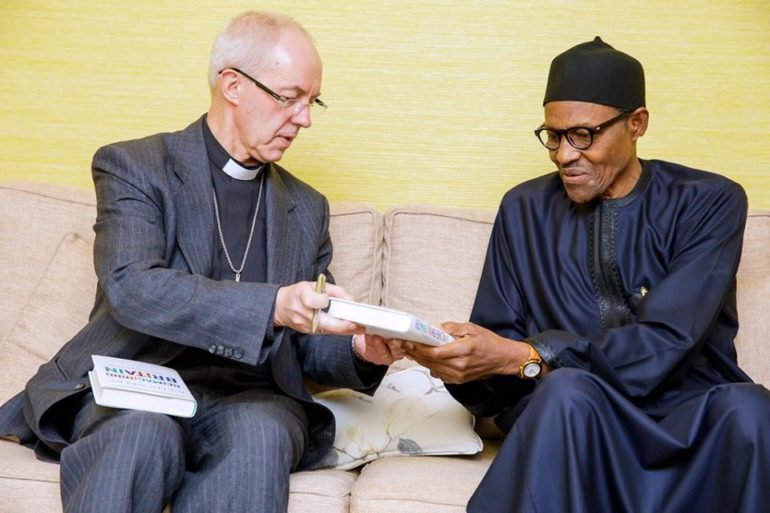
Following a meeting with the Archbishop of Canterbury, the President of Nigeria Muhammadu Buhari has said his government is working “quietly” to secure the release of a teenage Christian girl kidnapped by Boko Haram.
Archbishop Justin Welby, as well as Secretary General of the Anglican Communion, Nigerian Archbishop Dr Josiah Idowu-Fearon, met Mr Buhari at Nigeria’s High Commission in London yesterday (11 April) and during their meeting, urged him “to do everything possible to secure” the release of Leah Sharibu, 14, one of the 110 school girls whom Boko Haram militants abducted in Dapchi in the north-eastern state of Yobe in February.
Boko Haram released 104 of the girls on 21 March following a deal brokered by the government. Leah was not released because she reportedly refused to convert to Islam. In a statement following the meeting, President Muhammadu Buhari explained that his government was handling Leah’s case “quietly” because “making noise would not help”.
He continued: “We are collecting as much intelligence as possible, working with the Red Cross and other international organisations. There are too many fraudulent people around; we won’t deal with them. That was how we got the Dapchi girls back, and the Chibok girls”, he said.
Problem is ‘not religious’
Archbishop Welby said that the two men also discussed “the complex security situation in Nigeria” and the conflict in the country’s Middle Belt involving Fulani herdsmen. “I offered support in seeking a sustainable solution to the herder-farmer conflict”, according to the Anglican Communion News service ACNS.
Who are the Fulani?
Buhari emphasised that his government was “working on solutions” and that the problem was “not religious, but sociological and economic”, however he acknowledged that the weaponry carried by the Fulani had become more sophisticated, and education was needed so that people “can be free from religious manipulation”.
Christian leaders in Nigeria have frequently accused President Buhari of not doing enough to deal with the Fulani violence.
Following another spate of attacks in January the Archbishop called on Nigeria’s President to “act now to end this violence” as a new branch of Islamic State was discovered in the country which recruits foreigners to act as Fulani herdsman.
‘Religious cleansing’
A report that was released by the Christian charity Open Doors in January highlighted Nigeria’s failed attempts, over decades, to deal with the violence perpetrated by Fulani Muslim herdsmen in southern Kaduna, one of the country’s Middle Belt states which has been triggered by a number of (historical) factors. It concluded that continued failings would force Christians to leave the area in a pattern it analysed as “religious cleansing” that was part of a drive for “the Islamic war of expansion”.
During the meeting the archbishop said he “expressed deep concern about the suffering resulting from raids on Christian communities and villages as far south as Delta State. We discussed the causes of such depredations, which have led to very many deaths and threaten an escalation of violence. I urged measures to restore confidence in the neutrality of the state, and spoke of the suffering of the poor in such tragedies.”
Nigeria’s President is in London where he hopes to attend next week’s meeting of the Commonwealth Heads of Government.
